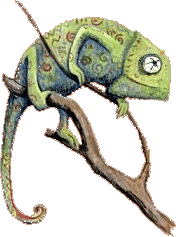- What is jRate?
- Why is jRate's Logo a Chameleon?
- Who is writing jRate?
- When will jRate be available?
- Will jRate run on any platform?
- HEEEEEEEEEEEELLLLLLLLLLLLLLP!
jRate (Java Real Time Extension) is an extension of the GCJ compiler front-end and runtime system that adds support for most of the features specified in the RTSJ specification. Currently it consists of a series of patches that are applied to GCJ runtime system implementation in order to add some hooks that are used by jRate implementation. Currently jRate consists in a collection of Java and C++ classes.
First of all I love chameleons, they are wonderful animals. Other than my passion for these little cute animals, the reason for jRate's Logo to be a chameleon is that these animals have an amazing ability to to "adapt" to their environment, and so wishes jRate.
jRate was initially designed and implemented by Angelo Corsaro as part of his PhD work.
For a full list of contributors, see the AUTHORS file from the jRate distribution. Active members on the SourceForge development team are listed here.
jRate is available now! You can download a stable version or obtain cutting-edge development versions via Subversion.
In theory jRate should be able to run easily on any POSIX OS, such as Linux, QNX RTP etc. Currently we are focusing mostly on Linux, and our current stable and beta releases run on Linux/x86 and Linux/powerpc (and perhaps others as well, though it's untested).
We keep some additional documentation over on our SourceForge project page that you may find useful, including our "Common Pitfalls" document on building jRate from sources, and our "Getting Started with jRate" document. If you still need help, you can submit a question to the jRate support tracker or use the SourceForge jRate user forums. All of these features are available from the SourceForge jRate project page.
Alternatively, you can contact the jRate users' mailing list. Make sure you subscribe so you get answers to your question!

